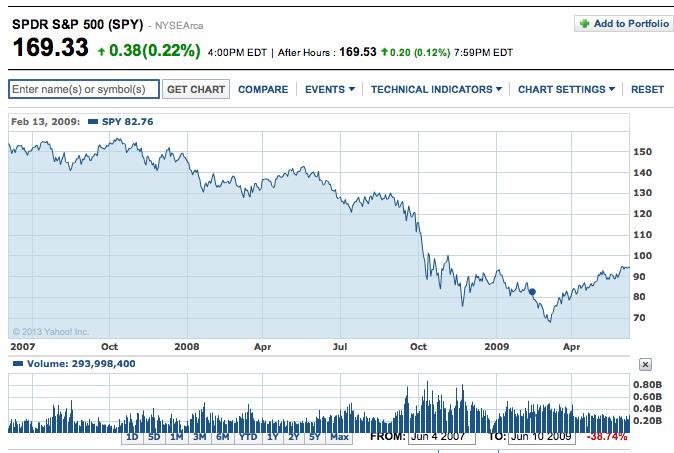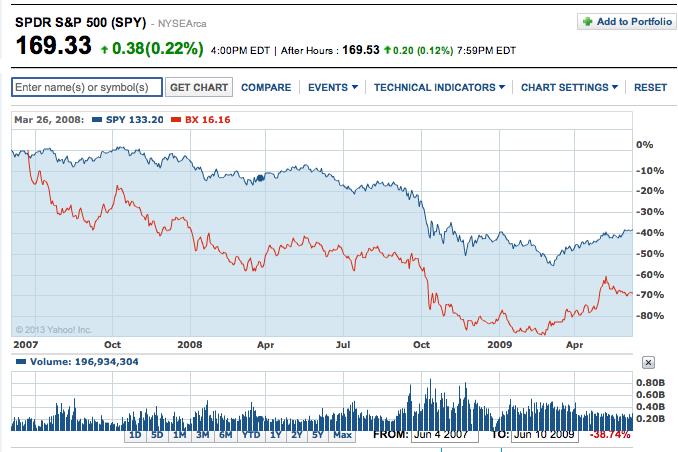As regular readers know, I normally wrap up my stories with an “INVESTOR TAKEAWAY” section at the end. This particular article is rather unique, so very early on, I am going to tell you what you will learn from it.
First, my most faithful reader contacted me today with a “heads up” – essentially alerting me to take a close look at the activities of the Blackstone Group (BX)[1] this month, and relate that news to its activities back in June of 2007. I have never doubted this gentleman’s intellect and insight, but this story has turned out to be like an onion – the more I unravel of it, the more fascinated I become!
So, sit down, lean back, and kick your feet up on a nice footrest. From this intricate, interconnected story, I hope you will recognize:
1) Sometimes “deep pockets” sell near the top;[2]
2) There is real risk in the markets – even for some of these “deep pocket” investors;
3) The chorus from Joni Mitchell’s beautiful song, “The Circle Game”, poetically expressing the rhythms and cycles of a maturing human life, also expresses an essential truth about the rhythms and cycles related to investments – especially real estate investments!
Let’s begin by moving back in time to 2007! The Blackstone Group (BX), which until then was a secretive private equity company that dabbled in an extremely broad range of investment activities, was inspired to take advantage of the popularity and success of world equities – and in particular, U.S. equities. In order to “reap the harvest” of its own reputation and success, Blackstone initiated an initial public offering (IPO) in June of 2007 – priced at $31/share and raising an impressive $4.1 billion! Befitting the market tone of that day, the IPO zoomed upward on its first day of trading by 13.1% to $35.06!
This particular IPO was noteworthy for a reason we may (in retrospect) find surprising. It was the very first IPO from any of the prestigious members of a small coterie of New York private equity firms.[3] Therefore, the New York Stock Exchange was crawling with reporters and media cameras on the day of the IPO. That day also provided a setting within which CNBC could not help itself – it just had to (once again) over-hype and overplay an issue. As a reporter interviewed Tom Wolfe[4], he inspired Wolfe to pontificate by offering this absurdity: “We may be witnessing the end of capitalism as we know it.”[5]
All of the market historians who are reading this story recognize the timing of this Blackstone IPO vis-à-vis the price action within the S&P 500 Index (SPY). June was not the “tippy top” of the S&P 500 Index price graph, but it was as close as could be realistic within the bounds of human perception. The market bottomed in March of 2009.
If you thought that the Facebook (FB) was the epitome of a disastrous IPO, you obviously don’t know enough about the BX IPO!
Take a look at this comparative graph of BX vis-à-vis the S&P 500!
One year after the IPO, BX stood at around $18/share. Seven and one-half months later than that (2/16/09) the price was $3.96/share (a closing basis low). Talk about a “disaster”!!
Naturally, a class action suit arose, accusing Blackstone Group management of having misrepresented (in the IPO disclosures) the true value of three companies within which BX was invested. Plaintiffs claim that said investments were already on the decline at the time of the IPO.[6]
Why is all of these “ancient history” relevant for today?
That five-year long, high stakes class action suit was just settled in a Manhattan courtroom.[7] Without admitting guilt, wrongdoing, or liability[8], Blackstone agreed to pay out $85 million to members of the suit.
Your next question should be: “Why did Blackstone cave?”
The answer is two-fold and simple: 1) a public trial of this suit was scheduled to begin during the following month; 2) Blackstone just filed (with the SEC) their intention to issue an IPO of a minority stake in Hilton Worldwide Holdings Inc. at some point early next year. Can you imagine the high-stakes risk to Blackstone of marketing an IPO at the same time the news media report ugly details from a standard-issue 2007 Wall Street “sales job” on the BX IPO?!!
In other words, Blackstone “caved” because it’s own corporate interests compelled it to settle. There was not really a logical alternative, given all the applicable factors involved. You should consider this fact an “unofficial” learning point – namely, big business will most quickly agree to enable shareholder “justice” when it is in their own corporate self-interest.[9]
This particular story will prompt a “blood boiling” reaction within thousands of people. In general, these folks will think: “Look, I just knew it! Those blankety-blank crooks just knew the market was going to collapse and purposely marketed their IPO at the ‘top of the market’! I knew it. I just knew it!”
Trust me, friends, I understand that reaction, and I can also empathize with it. However, despite the fact that I am just as cynical, skeptical, and “conspiracy-minded” as the next person – I assure you that, back in mid-2007, neither Blackstone nor any other investment firm had any idea regarding the depth and breadth of the reckless financial management going on at Lehman Brothers, Bear Stearns, Countrywide Mortgage, etc. They could have sensed the possibility of a market top; but they could never have foreseen the full horrors of the impending financial meltdown!
“Prove it, Petty!” I hear some of you saying.
To which I reply with an understanding: “I am here to serve you. No problem!”
If back in 2007, Blackstone had been a truly omniscient, strings-pulling, manipulative financial giant, would it have purchased the Equity Office Properties Trust from a Chicago real estate titan known in the industry as “the grave dancer”?[10] In what was, up to then, the biggest “leveraged buyout ever” (LBO) Blackstone paid Zell a record $39 billion for that trust – netting Sam Zell a tidy $1 billion profit! Within less than two years, virtually all components of that trust had moved “under water”. Therefore, did Sam Zell “hoodwink” Blackstone? Or was the transaction just one more piece within the intricate, finely woven history of real estate transactions – a history that has long been defined by an endless series of rhythms and cycles?
In that same year, Blackstone also invested a boatload of real money into the $26 billion deal that took the Hilton Hotel chain private: $19 billion cash and $7 billion of debt. It didn’t take long for Blackstone to feel as though the whole world could now see that it had (figuratively) egg running down its corporate face. By early 2009, it had become crystal clear that Blackstone had stumbled into one of history’s worst business deals!
This brings us to an historical (not so) “fun fact”: on September 15, 2008, Lehman Brothers declared bankruptcy. We have reached the fifth anniversary![11] That failure, and the seizing up of credit lines that followed, prompted Blackstone to write down its investment in Hilton by more than half! Now you tell me, does that sound like a company that is all knowing and all-powerful? Adding insult to injury, Blackstone lost a legal action brought against it by Starwood Hotels and Resorts Worldwide (HOT)[12] for corporate espionage – a loss that cost them an additional $75 million!
Friends, this is just the tip of the iceberg regarding how treacherous the “finance game” can be for investors – yes, even the “deep pocket” investors! Consider this very limited listing of notable private equity failures:
1) Texas energy giant, TXU, was taken private in 2007 for $45 billion by Goldman Sachs (GS), Citigroup (C), Morgan Stanley (MS), TPG Capital, K.K.R., and Lehman Brothers. It was the largest leveraged buyout ever – and may have morphed into the biggest headache ever. The company name is now Energy Future Holdings, and groups of investors are engaged in an ongoing battle for company control.
2) Credit card processing company, First Data, was taken private for $29 billion in 2007 by K.K.R. It has struggled ever since to become profitable. Now a hot shot executive from J.P. Morgan Chase is serving as chief executive, and initiating “out of the box” strategies to perform better!
3) Mega huge radio and outdoor ad company, Clear Channel, was acquired by Thomas H. Lee Partners and Bain Capital in 2008 for $19.5 billion. Immediately, revenue fell due to economic collapse and the company’s debt load started choking it. It is still striving for survival!
4) This one caught me by surprise! The retailer that started the “… ‘R’ US” craze (Toys “R” US) was purchased by Vornado Realty Trust, K.K.R., and Bain Capital in 2005 for a smallish $6.6 billion. Even at that price it has struggled ever since; having tried unsuccessfully to go public in 2010 due to “lack of interest”.[13]
Of course, not all buyouts from that era were doomed to failure:
1) Neiman Marcus, the luxury retail chain whose price points are way above my own, was sold to a Canadian pension plan and Areas Management for $900 million more than the private equity folks paid for it in 2005!
2) Freescale Semiconductor, the computer chip maker purchased for $17.6 billion in 2006 by four private equity firms, struggled for over 5 years due to reduced customer demand, combined with lots of debt. As a result, the pricing of its 2011 IPO had to be set at the lower end of projections.
3) Alliance Boots, a European pharmacy retailer that many of you will recall was the object of an unusual deal last year by Walgreens (WAG)[14]. By 2015, Walgreens will assume full control of Alliance from K.K.R. [15]
To summarize up to this point, here we have the vaunted, much trumpeted Blackstone Group – the object of excessive media hype in June, 2007, because it was the first of the then legendary (and extremely secretive) private equity groups to “go public” – sitting some18 months later holding a genuine, certified, unqualified “loser”. After all, how else can you characterize the Hilton Hotel chain back in those days? Blackstone had paid $19 billion in cash (and $7 billion debt) for the enterprise – and was already “throwing in the towel” on half of that investment – writing it off in their books.[16] Now that is a “loser”!
We will complete this story about Blackstone, market tops, investment risks, and real estate cycles and rhythms in Part II.
Submitted by Thomas Petty MBA CFP
[1] Blackstone is currently the world’s largest manager of alternative assets!
[2] My standard way to say that is through reference to “the big boys”. But that is sexist. “Deep pockets” is almost gender neutral.
[3] In that day, this IPO would have had most of the Hollywood cache and hype of a big, present day Elon Musk presentation.
[4] Wolfe authored Bonfire of the Vanities – a 1987 novel that recounted a drama about ambition, racism, social class, politics, and greed in 1980 (essentially, a tell-all look at Wall Street).
[5] It is moments such as this that leave me wondering why anyone pays any attention to CNBC.
[6] To which I say: “Duh! When has any marketing professional ever ‘undersold’ her/his product! Buyer Beware!!”
[7] The suit led Blackstone and 25 third party groups to submit over 5 million pages of documents to the court!
[8] Control your utter shock!
[9] If this topic was part of a geometry class, this learning point would be an axiom! It’s corollary is equally significant – when an action is not in its corporate interest, you may have to wait until hell freezes over for the big business to relent.
[10] Sam Zell, founder of Equity Group Investments, earned that nick name in the early 1990’s because he reveled in being very distressed real estate properties, and then ride them to a profitable recovery!
[11] I swear it feels three times that long ago!
[12] There is no present truth to the rumor that, should the Kardashians decide to initiate an IPO on their family business and “brand”, they will pay Starwood millions for its much coveted ticker symbol!!
[13] Someone hero needs to leap into the fray to “Save Geoffrey the Giraffe” (the story logo!!).
[14] OK, I confess, when I saw the acquisition’s name, I momentarily wondered if WAG was going into the boot business!
[15] In 2007, when K.K.R. acquired Alliance, it was Europe’s largest LBO ($22 billion).
[16] As you will recall, the leisure and travel industry slowed considerably as the financial crisis widened and deepened – which in those days felt “endless”.
Related Posts
Also on Market Tamer…
Follow Us on Facebook



 Thinking of Buying Archer Aviation Stock? 3 Things You Should Know
Thinking of Buying Archer Aviation Stock? 3 Things You Should Know



